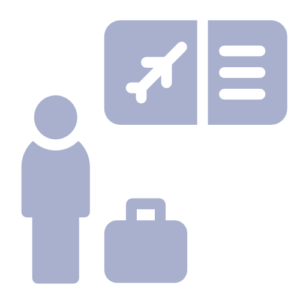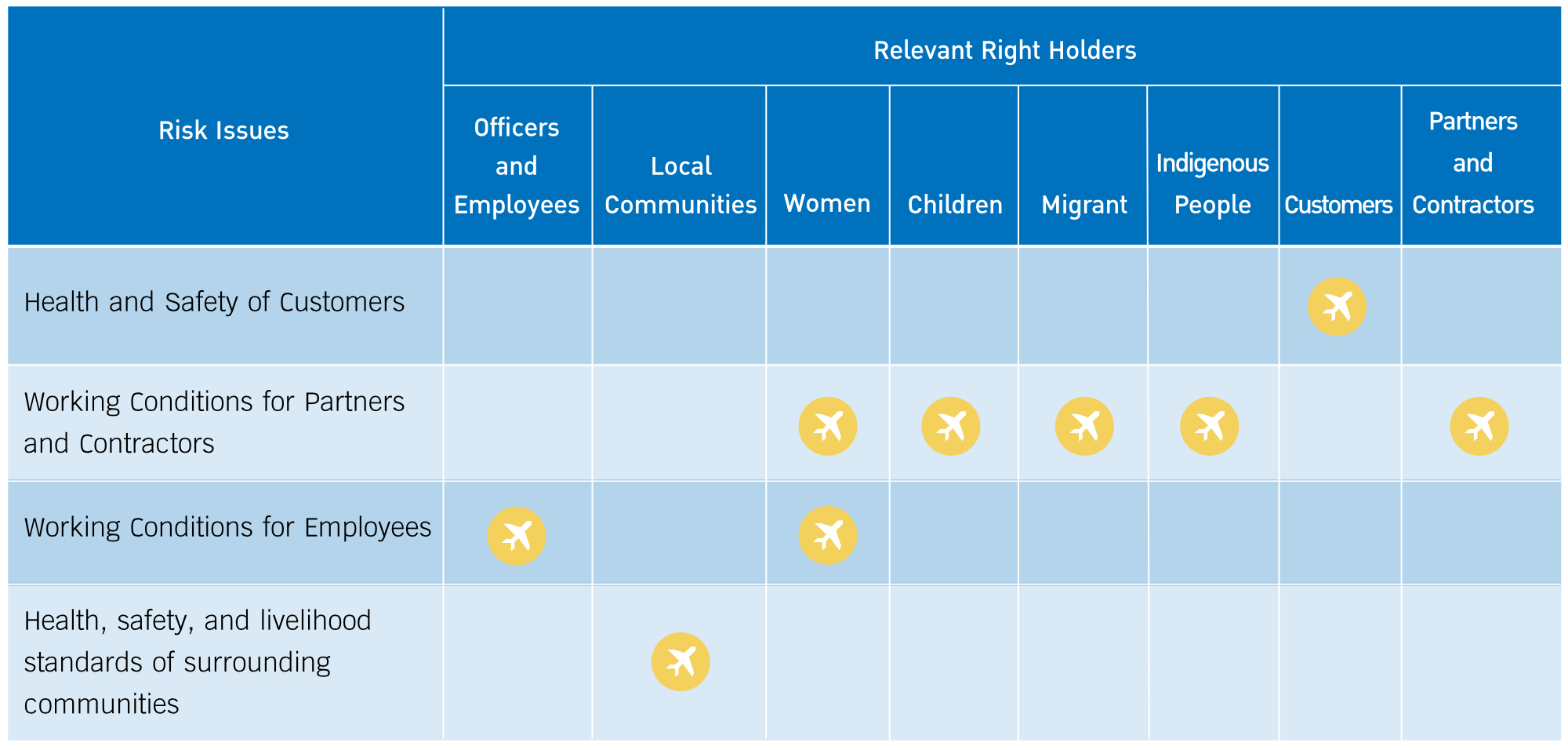Human Rights

Customer
Importance
AOT's business operations, throughout the entire value chain, may be at risk of human rights violations that negatively affect all stakeholders including business alliances, i.e., partners and contractors, staffs and employees, communities and societies, and customers. Potential violation concerns in terms of safety in life and health, employment conditions, discrimination and harassment, freedom of association, privacy, etc., are watched by regulators, mass media, and investors. Therefore, AOT places importance on human rights agenda by promoting knowledge and creating awareness, this leads to the prevention and avoidance of human rights violations throughout the value chain.
Policy
AOT operates its business in accordance with the Human Rights Policy being announced in 2018 which is consistent with the United Nations Guiding Principles on Business and Human Rights (UNGP), Core International Human Rights Treaties, International Covenant on Civil and Political Rights (ICCPR), International Covenant on Economic, Social and Cultural Rights (ICESCR), ILO Declaration on Fundamental Principles on Business and Human Rights, Principles to protect, respect and remedy for the impacts of human rights violations or The Ruggie Framework, Sustainable Business Partners Guidelines and AOT Code of Conduct which are applicable throughout the organization. AOT's human rights policy covers all rights of AOT’s employees, business partners, customers, communities, and the environment. Details of the policy comprise respecting the law and other related rules, and promoting hearing process, channels for receiving complaints along with a complaint management system and remedy measures in case human rights violation occurs.
Employee Rights
The right to fair and reasonable employment conditions by taking into account employee health and safety without discrimination of any kind while respecting freedom of association and collective bargaining
Community and Environmental Rights
The right to an adequate standard of living, health and community safety through environmental management to minimize impact on communities
Business Partners Rights
The right to fair treatment by taking into account laborers’ health and safety. prevention of illegal labor prevention, and consistent operational monitoring
Customer Rights
The right to customer health, safety and well-being without discrimination of any kind while maintaining customer privacy
See more details
Management Approach
AOT persists to respect and prevent fundamental human rights violations of all AOT stakeholders (customers, community and society, business alliances, including partners and alliances, and AOT employees). The fundamental human rights issues that AOT gives importance are human trafficking, forced labor and child labor, discrimination, collective bargaining, and equal remuneration. Additionally, there are other fundamental human rights issues that AOT has continually prioritized and managed, including safety and healthy working environment, decent work conditions, good quality of life, etc.
Human Rights Due Diligence
AOT provided human rights management through the Human Rights Due Diligence process to assess human rights risks and formulated the essential human rights management measures of the organization as well as determining complaints or suggestions submission channels on human rights to be accessible by all sectors, with details as follows:

Reference: UN Guiding Principles on Business and Human Rights
AOT's Risk and Human Rights Impact Assessment
AOT’s Human Rights Risk and Impact Assessment is comprised of the following 4 steps:
Identifying the human rights topics
To review human rights topics considered as material in the value chain of AOT which is related to stakeholders from reliable human rights sources, industrial sources, and internal expert resources.
Creating a risk register
To identify additional mitigation measures for human rights with high potential risks after the issuance of mitigation measures and to regularly monitor operational progress.
Human rights risk assessment
To assess various risks by using indicators of violence levels and impact opportunities while taking into consideration inherent risk and residual risk after the current mitigation measures have been taken.
Reveal progress in operations
To disclose operational progress and the proportion of mitigation measures enforcement to the various stakeholder groups.
Scope of Human Rights Risk and Impact Assessment
AOT assesses risk and human rights impact at AOT operation area covering 6 airports and its Head Office, AOT's value chain and business partner relations such as subsidiaries, joint venture companies, mergers or acquisitions of business. The human rights risks and impacts are identified covering these issues:
- Forced labor
- Child labor
- Freedom of Association
- Collective Bargaining
- Equal remuneration
- Discrimination and Harassment
- Human trafficking
- Other related issues
Including the classification of stakeholders (or rights holders) who may be affected as follows:
- Officers and employees
- Partners and contractors
- Customers and passengers
- Community and the environment
Including related vulnerable groups such as women, children, indigenous people, migrant labor, third-party contracted labor, LGBTQI+, people with disabilities, pregnant women and just to name a few.
Human Rights Issues Found to be at High-Risk
Identification of stakeholders who may be affected by each issue

See more details
Complaint
AOT has provided complaints and comments submission channels on human rights to be accessible by every sector of stakeholders through a systematic process of complaints and comments management. It is to ensure that all issues received by AOT will be inspected and improved for better operations. This leads to the avoidance of human rights violations and the broader promotion of the human rights respect.
Complaint and Suggestion Channels on Human Rights Violations
See more details
Management Evaluation
AOT assesses human rights risk management through internal audit processes and human rights risk monitoring as well as following up complaints to regularly report the results to the Corporate Governance Committee and senior management. In addition, AOT has scheduled regular reviews of policies and procedures on human rights to be in line with the potential human rights trend.
Last Updated: May, 27 2024
